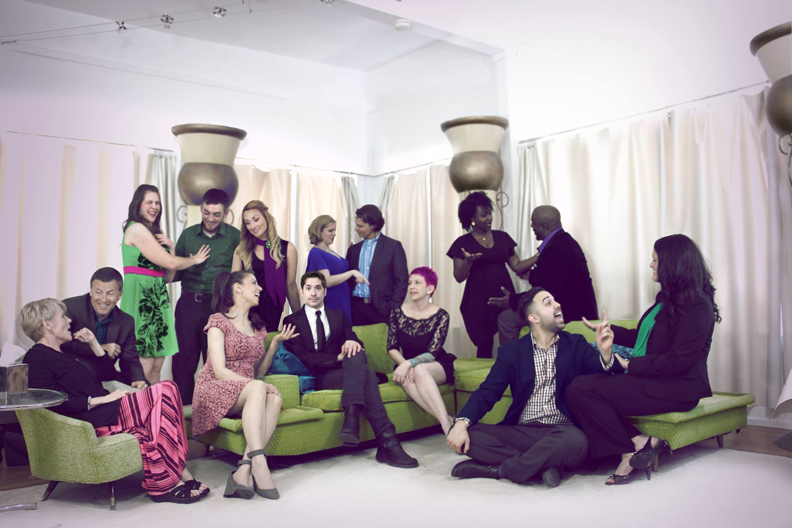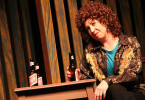Company
Pollard Theatre Company
8 p.m. June 26-27, 2 p.m. June 28
8 p.m. July 2-3, 2 p.m. July 5
8 p.m. July 9-11
Pollard Theatre | Guthrie
Pollard Theatre Company’s current production of Company achieves limited success in spite of itself. This 1970 (with later revisions) musical by Stephen Sondheim (music and lyrics) and George Furth (book) covers health fads, dating and its disappointments, marriage, divorce, and the effects of pot on “squares.” Interestingly, these issues don’t seem dated at all.
But skimpy scenery and a reduced pit orchestra put the Pollard production on a flimsy foundation. The scenic design (by James A. Hughes) consists mainly of wooden steps and platforms painted black with a table and a few chairs (all black). All this inkiness just looks gloomy, not chic. A four-piece combo accompanies the show. A long second-act dance sequence (well-performed by Jennifer Teel) suffers from the lack of a full orchestra. Where the show needs a wailing band, it instead has two wheezing synthesizers that cannot match the power and excitement of a full brass section.
So what makes the production succeed? The cast. And what a cast it is! I don’t know the last time an area production assembled such an aggregation of triple threats (“triple threat” in theatrical terms means a performer adept in acting, singing, and dancing).
In Sondheim musicals, the lyrics are everything, and this cast does an exemplary job with them. Some might call “Getting Married Today” a patter song, but I think machine gun song is more like it. Gwendolyn Evans whips through the lyrics while skillfully playing Amy, a woman suffering extreme marriage anxiety, with Scott Hynes as her fiancé.
Matthew Alvin Brown plays the protagonist, Robert, enduring (rather than celebrating) his 35th birthday still wifeless. He has a host of friends whose concerns range from finding him a mate to convincing him to stay single. Brown carries the show on his reliable shoulders. Although he isn’t a power singer, it’s great to see Brown in this role.
In supporting roles, Lexi Windsor and Renee Anderson give outstanding performances. Windsor frequently performs in musical theater, but her work here as a spaced-out flight attendant makes me wonder how she would be in dramatic or comedic roles. The magenta-haired Anderson is excellent in the show’s other machine gun song, “Another Hundred People,” and as Robert’s outré girlfriend.
Elin Bhaird plays the older Joanne as a dark, pathetic figure. Her rendition of “Ladies Who Lunch” is both comedic and disturbing. Harold Mortimer is her empty suit of a husband.
Adding to the wide variety of characters, Robert has many other concerned friends. Cory King and Matthew Morales play a couple with Extreme Competition Disorder. Susan Riley and Charlie Monnot are exes who could not be more happily divorced. Nakeisha McGee and W. Jerome Stevenson go happily with the flow as a couple with more depth than is at first obvious.
Timothy Stewart has staged the production with efficiency at a quick pace. All couples stay onstage most of the time with Jennifer Rosson responsible for the choreography.
Company was big news in its day. It has no plot, but examines various facets of intimate relationships between human beings. Thus, the term “concept musical” was coined to describe the show, though Sondheim prefers “observational musical.” Whatever you call it, Company rates revisiting on occasion.





